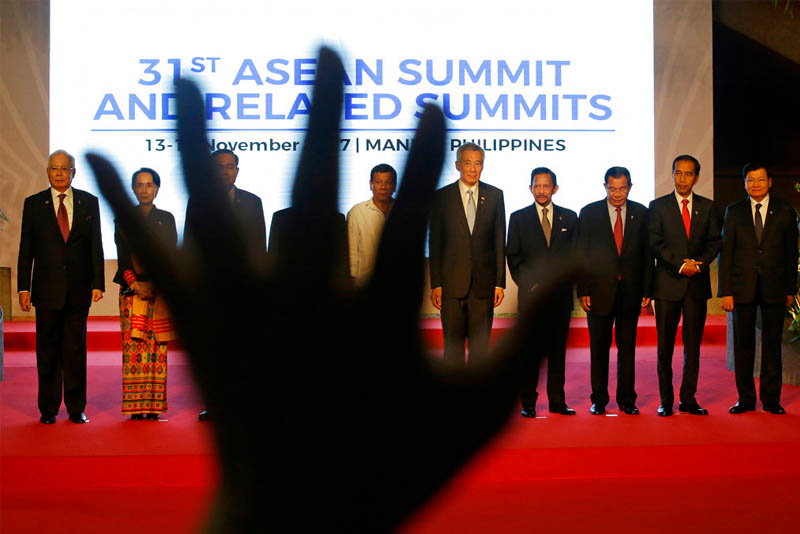ASEAN non-intervention hinders discussion on rights issues — experts

A photographer raises his hand to call the attention of ASEAN leaders during a family photo before the 31st ASEAN Summit in Manila, Philippines on Monday Nov. 13, 2017. From left, Malaysia's Prime Minister Najib Razak, Myanmar's State Counsellor Aung San Suu Kyi, Thailand's Prime Minister Prayuth Chan-ocha, Vietnam's Prime Minister Nguyen Xuan Phuc, Philippines' President Rodrigo Duterte, Singapore's Prime Minister Lee Hsien Loong, Brunei's Sultan Hassanal Bolkiah, Cambodia's Prime Minister Hun Sen, Indonesia's President Joko Widodo and Laos Prime Minister Thongloun Sisoulith. AP/Aaron Favila, Pool
MANILA, Philippines — With the Association of Southeast Asian Nations’ bedrock principle of non-interference still in place, people should not expect that the region’s leaders to press their peers to address their respective domestic crises, particularly those related to human rights.
“That’s the way ASEAN is at the moment until they improve it by enhancing their consensus principle and really learning how to spell human rights,” the country’s former top diplomat said on ANC’s "Headstart."
Southeast Asian commentator and columnist Karim Raslan also said that human rights is not an issue that will not excite the regional bloc’s member states, noting that they are “never going to criticize their fellow ASEAN.”
He added: “We have embodied non-intervention at the core of ASEAN. If we didn’t have this, we wouldn’t meet year in and year out.”
Non-interference. A roadblock?
Romulo, moreover, emphasized that the Treaty of Amity and Cooperation, which was signed in 1976, is meaningless because of the principle of non-intervention.
“The concept of non-intervention has slowed us down by a great deal,” Romulo said.
Former President Ferdinand Marcos was one of the peace treaty’s signatories along with Lee Kuan Yew, Datuk Hossein Onn, Kukrit Pramoj and Suharto—leaders of the original members of ASEAN.
Non-interference is one of the principles of TAC of 1976:
- Mutual respect for the independence, sovereignty, equality, territorial integrity, and national identity of all nations;
- The right of every State to lead its national existence free from external interference, subversion or coercion;
- Non-interference in the internal affairs of one another;
- Settlement of differences or disputes by peaceful manner;
- Renunciation of the threat or use of force; and
- Effective cooperation among themselves.
Romulo cited the Rohingya crisis in the northern Rakhine state of Myanmar as proof of the association’s silence and inaction on issues.
“I don't hear anybody making noise about the Rohingyas and how they're treating with a great deal of respect Aung San Suu Kyi,” he said.
The regional bloc has been repeatedly criticized for its silence on the plight of Rohingya Muslims. More than 600,000 Rohingyas have fled to Bangladesh to escape murder, rape and destruction of villages since August 25.
ASEAN Chairman's Statement on Rohingya
On September, the ASEAN Chairman Statement—through Foreign Affairs Secretary Alan Peter Cayetano—condemned the attacks against Myanmar security forces and acts of violence but failed to mention the Rohingyas.
In a rare move, Malaysia disassociated itself from the ASEAN chairperson’s position and described it as a “misrepresentation of the reality of the situation.”
Last April, Human Rights Watch Asia Division Deputy Director Phelim Kine made a strong statement regarding the region's non-interference principle.
“Expect ASEAN leaders to yet again throw the human rights of an Asian country under the bus by remaining silent about Duterte’s abusive drug war by implicitly or explicitly invoking the organization’s ‘non-interference’ principle,” Kine said ahead of the 30th ASEAN Summit.
But President Rodrigo Duterte, during his opening speech at the 30th ASEAN summit, set the tone of talks with his fellow ASEAN leaders by stressing the principle of non-interference.
“Relations bear fruit when they are based on mutual respect and benefit. Dialogue relations can be made more productive constructive if the valued principle of non-interference in the internal affairs of the ASEAN member states is observed,” he stressed.
Duterte also emphasized that relations with dialogues partners—including China, the European Union and the United States—would remain solid if non-ASEAN states will “learn to respect and value the peaceful resolution of disputes.
READ: Duterte sets 'non-interference' among ASEAN colleagues
Calls to bring up regional issues
Because of the ASEAN’s cornerstone non-interference concept, groups called on non-ASEAN heads of states to address regional issues such as the bloody “war on drugs” in the Philippines, the Rohingya crisis in Myanmar, the crackdown on dissenters in Vietnam and Cambodia and junta rule in Thailand in the ASEAN meetings.
“World leaders shouldn’t return home from these summits without agreeing to targeted sanctions to pressure Burma to end its abuses and allow in independent observers and aid groups,” HRW Asia Director Brad Adams said, referring to the Rohingya crisis.
He also noted that world leaders should confront Duterte about the extrajudicial killings brought by his war on drugs.
READ: Leaders urged to bring up regional rights issues at APEC, ASEAN
A coalition of 270 civil society organizations and leaders worldwide slammed the regional bloc’s silence on the said matters, noting that “leaders should warn other countries against adopting similar tactics.”
Ahead of US President Donald Trump’s visit to the country, The Tom Lantos Human Rights Commission of the US Congress called on him to express his concern over the killings associated with Duterte’s drug war.
But Duterte said he wants Trump to lay off the topic of human rights during their first bilateral meeting.
“Lay off, that is not your business. That is my business. I take care of my country,” Duterte said.
- Latest
- Trending





























